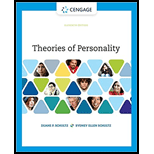
THEORIES OF PERSONALITY (LL)
11th Edition
ISBN: 9780357939932
Author: Schultz
Publisher: CENGAGE L
expand_more
expand_more
format_list_bulleted
Question
Chapter 5, Problem 16RQ
Summary Introduction
To explain :
How Horney used free-association as a method of assessment and difference from Freud’s usage.
Introduction:
Horney used free-association differently than Freud used to use it. She used it as to know the emotions of human and to know how they will perceive Horney, their doctor.
By that she describes the attitude of the patient to deal with life, and by self-analysis they can resolve their conflicts.
Expert Solution & Answer
Trending nowThis is a popular solution!

Students have asked these similar questions
Describe the difference between formative and summative evaluation and discuss why both are important when developing and implementing social welfare policies and programs.
Please cite in text source and list references.
how do religious services or gatherings take place with buddhist?
how did you as a buddhist handle challenges and discrimination
Chapter 5 Solutions
THEORIES OF PERSONALITY (LL)
Knowledge Booster
Similar questions
- what are the common misconception about buddhism?arrow_forwardMatch the term with the short description. Prompts Answers Recitative A composition or movement inserted between parts of a longer composition Aria A speech-like style of singing Overture A short instrumental introduction to a larger work Interlude A song for solo voice with orchestra that showcases vocal virtuosityarrow_forwardThe composer/conductor who double orchestra musicians’ salaries and treated them with respect was: a) Joseph Haydn b) Felix Mendelssohn c) Ludwig van Beethoven d) Richard Wagnerarrow_forward
- Match the term with its short description. Prompts Answers Concerto The full orchestra or a large group of musicians contrasted with a smaller one Concerto grosso Composition for several instrumental soloists and small orchestra; usually in three movements Fugue A polyphonic composition based on one main theme or subject treated in counterpoint Tutti Extended composition for instrumental soloist and orchestra; usually in three movementsarrow_forwardMatch the term with the short description. Prompts Answers Coda Is section displaying technical virtuosity that is played or improvised by the soloist without orchestral accompaniment Exposition A concluding section that rounds off a movement by extending the tonic chord Cadenza The first section of a sonata form Pedal A single tone, often in the bass, that is held while other voices produce changing harmonies against itarrow_forwardThe first examples of polyphony are believed to be originated between 700-900 C.E. - when French nobles composed love songs for court festivities - in Northern Italy - when musicians composed new songs to accompany dances - in the Notre Dame cathedral in Parisarrow_forward
- During the Renaissance, it was common practice for noble families to bring their musicians along when traveling from one castle to another. a) True b) Falsearrow_forwardIn the Middle Ages _____ were the center of learning and music making. - crusades - castles - schools - churchesarrow_forwardWhat sentences best describe the troubadours of the Middle Ages? (Mark all that apply) - Performed music and acrobatics in castles, taverns, and town squares - Composed songs on love and honor - Belong to the lowest social classes - Distributed news and gossip from town to townarrow_forward
- Select all the predominant types of composition in the Renaissance period: (Mark all that apply) - the mass - motets - madrigals - symphoniesarrow_forwardSelect items that make a cantata and an opera different. - use of scenery and costumes - acting - length of the composition - use of vocal soloistsarrow_forwardDuring the Renaissance period, many musicians found employment in: a) Churches b) Schools c) Royal Courts d) Regional orchestrasarrow_forward
arrow_back_ios
SEE MORE QUESTIONS
arrow_forward_ios
Recommended textbooks for you
 Ciccarelli: Psychology_5 (5th Edition)PsychologyISBN:9780134477961Author:Saundra K. Ciccarelli, J. Noland WhitePublisher:PEARSON
Ciccarelli: Psychology_5 (5th Edition)PsychologyISBN:9780134477961Author:Saundra K. Ciccarelli, J. Noland WhitePublisher:PEARSON Cognitive PsychologyPsychologyISBN:9781337408271Author:Goldstein, E. Bruce.Publisher:Cengage Learning,
Cognitive PsychologyPsychologyISBN:9781337408271Author:Goldstein, E. Bruce.Publisher:Cengage Learning, Introduction to Psychology: Gateways to Mind and ...PsychologyISBN:9781337565691Author:Dennis Coon, John O. Mitterer, Tanya S. MartiniPublisher:Cengage Learning
Introduction to Psychology: Gateways to Mind and ...PsychologyISBN:9781337565691Author:Dennis Coon, John O. Mitterer, Tanya S. MartiniPublisher:Cengage Learning Psychology in Your Life (Second Edition)PsychologyISBN:9780393265156Author:Sarah Grison, Michael GazzanigaPublisher:W. W. Norton & Company
Psychology in Your Life (Second Edition)PsychologyISBN:9780393265156Author:Sarah Grison, Michael GazzanigaPublisher:W. W. Norton & Company Cognitive Psychology: Connecting Mind, Research a...PsychologyISBN:9781285763880Author:E. Bruce GoldsteinPublisher:Cengage Learning
Cognitive Psychology: Connecting Mind, Research a...PsychologyISBN:9781285763880Author:E. Bruce GoldsteinPublisher:Cengage Learning Theories of Personality (MindTap Course List)PsychologyISBN:9781305652958Author:Duane P. Schultz, Sydney Ellen SchultzPublisher:Cengage Learning
Theories of Personality (MindTap Course List)PsychologyISBN:9781305652958Author:Duane P. Schultz, Sydney Ellen SchultzPublisher:Cengage Learning

Ciccarelli: Psychology_5 (5th Edition)
Psychology
ISBN:9780134477961
Author:Saundra K. Ciccarelli, J. Noland White
Publisher:PEARSON

Cognitive Psychology
Psychology
ISBN:9781337408271
Author:Goldstein, E. Bruce.
Publisher:Cengage Learning,

Introduction to Psychology: Gateways to Mind and ...
Psychology
ISBN:9781337565691
Author:Dennis Coon, John O. Mitterer, Tanya S. Martini
Publisher:Cengage Learning

Psychology in Your Life (Second Edition)
Psychology
ISBN:9780393265156
Author:Sarah Grison, Michael Gazzaniga
Publisher:W. W. Norton & Company

Cognitive Psychology: Connecting Mind, Research a...
Psychology
ISBN:9781285763880
Author:E. Bruce Goldstein
Publisher:Cengage Learning

Theories of Personality (MindTap Course List)
Psychology
ISBN:9781305652958
Author:Duane P. Schultz, Sydney Ellen Schultz
Publisher:Cengage Learning